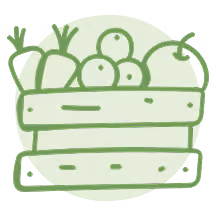Discover the Joy of Growing and Beekeeping — Naturally
Reconnect with nature through hands-on kitchen gardening and gentle, chemical-free beekeeping at Dunmore Country School.
Sustainable Gardening and
Beekeeping Haven
-

Peaceful Setting
Nestled in the tranquil country-side of County Laois, our gardens offer a warm, authentic space surrounded by nature.
-

Hands-On Learning
Discover the art of seasonal, no-dig gardening and gain practical knowledge in natural beekeeping with Warré hives.
-

Inclusive Courses
Whether you’re a beginner or an experienced gardener, our workshops are designed to support every skill level.
-

Sustainable Living
Learn to grow and harvest your own food, moving toward greater self-sufficiency and harmony with the land.
-

Joyful Harvest
Experience the satisfaction and joy that comes from nurturing nature and reaping the rewards of your efforts.
Explore
Our Courses
Grounded in Tradition,
Rooted in Nature
Founded by Tanguy de Toulgoët, a passionate horticulturist inspired by the French potager tradition. Dunmore Country School blends permaculture principles, nodig gardening, and biodiversity-friendly practices with Irish soil wisdom. We nurture soil health, seasonal growth, and ecosystem-friendly gardening, so what you grow not only tastes better and feels nourishing, but also supports the land for generations to come.
In-person and online courses to grow your skills, creativity, and connection
What Our Students Are Saying
-
We really enjoyed our day on Saturday and have learned alot and I’m motivated to get started now with the garden this year. We’ll start slowly and see how it goes. I thought the day was great and everything was very interesting and well done. I liked how the advise provided was tailored to the questions asked and you ensured that everyone was able to ask questions and learn what was needed. The food was also delicious. I would say to continue as it was and have no other recommendations for change at this time. We’ll certainly look at joining other classes in the future and will share your information.
Miriam
-
It was great to see you both and also the garden again in a different season. I found it all hugely informative and easy to take on board your knowledge through your relaxed manor. Saturday morning was spent sharpening tools and then going out our back gate to prune 9 apple trees that the council planted 2 years ago and have abandoned! Understanding the logic of how a fruit tree stays healthy from your course gave me confidence to thin out the branches and cut back the shoots.
Niall
-
Thank you very much for the very enjoyable and memorable day. You have a wealth of fabulous knowledge and we thoroughly appreciate you sharing it with us. It felt so special being invited into your lovely home and tasting Isabel’s wonderful preparations of the fresh ingredients. Mum very much enjoyed the day and has since been looking at purchasing a polytunnel. We look forward to our next visit!
Yvonne and family
-
Thanks for hosting the course we attended last week. I thoroughly enjoyed it! Your knowledge and passion were so impressive, and your practical advice made the process of creating a kitchen garden seem not only achievable but genuinely enjoyable. I liked the way you broke down each step and shared personal anecdotes to help beginners like me! And thanks for answering our questions with such patience and for providing valuable resources and tips. I feel much more confident about getting started and look forward to putting what I’ve learnt into practice. I plan to start small, as you suggested! Once again, thank you for a thoroughly engaging and informative session. I hope to attend more of your courses in the future!
Linda Gough
-
I really enjoyed my visit/workshop and observing the methods you use in growing vegetables and fruit. What really appealed to me was how the garden is focused on optimising, in a sustainable manner, the production of such a wide variety of vegetables and fruit. The lunch which Isabelle produced using the produce of your garden was delicious! Thank you both very much for such an enjoyable experience and I will be back!
Peter O’Reilly
-
Hi Tanguy and Isabella, I would like to thank you both for a lovely morning and very informative class yesterday. I will be implementing what I have learned over the coming days, weeks and months. I would like to thank you for the snack as well it was delicious. Looking forward to meeting the both of ye again in future classes. Thanks again.
Martin Pierce
Find Us in Durrow,
County Laois
We’re nestled in peaceful Swan road, near Durrow, Co. Laois. Free parking, friendly welcomes, and the quiet of the countryside await.
Seasonal Stories and
Tips From the Garden
Stay Rooted in The Garden
Get updates from the garden, plus courses, events, and seasonal inspiration by subscribing to our newsletter






